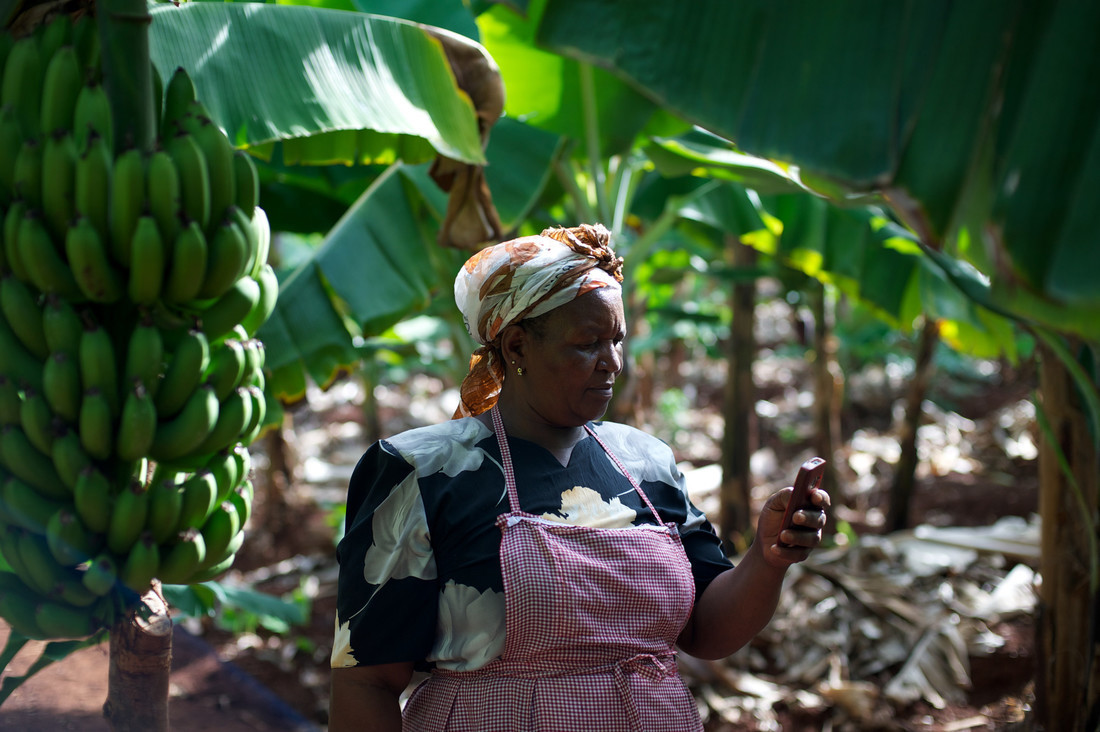
The Connected Farmer: Building Trust in the Digital Age
For the better part of a week in December, Nairobi was the world capital of thinking about how to enable 500 million smallholder farmers across the globe to access modern financial products and services. Two organizations dedicated to this objective, AGRA and Mercy Corps – both of whom are MasterCard Foundation partners – held inaugural learning events in the Kenyan capital. About 100 attendees represented partners from across AGRA and Mercy Corps program countries, including Kenya, Tanzania, Ghana and Zambia.
The AGRA gathering was the more intimate of the two. It brought together a diverse group of people, from agribusinesses and tractor companies to banks and mobile network operators. They’re all busy testing new models for extending financial services to smallholder farmers engaged in staple crop production.
In contrast, Mercy Corps’ AgriFin Accelerate (AFA) event was much larger, organized around 12 simultaneous morning and afternoon workshops. They covered a range of topics, including credit scoring, market access, contract farming and mechanization. The event was capped with a panel featuring “internet giants” Facebook, Google and OLX. They provided the audience with a glimpse into the future, as internet access and smartphones continue to spread across the continent, democratizing access to information and the wealth of resources available on these platforms.
A common thread running through both the AGRA and the Mercy Corps event was the evolving use of technology. In particular, people wanted to discuss digital channels and how they can deliver financial services to smallholder farmers. At our Foundation, we strongly believe in the use of technology to reduce the cost of serving excluded populations. It is a significant focus of our work to scale access to as many people as possible. As interactions between service providers and farmers increasingly occur over digital channels, however, we are hearing that a key challenge faced by many of our partners in the field is building trust – in the product, in the service, in the system itself.
In Ghana, the rural information service delivery company, Esoko, recently launched Fasiba, a virtual marketplace where farmers can lay away money towards the purchase of agricultural inputs. The issue of trust in financial services in Ghana is a challenge in the wake of microfinance frauds in the bread basket region of Brong Ahafo. Furthermore, the success of Esoko’s solution relies on farmers’ trust in both Esoko and the entire mobile money system. Network downtime, agent malpractice and unclear complaint resolution processes can erode trust and result in farmers turning away from the entire digital ecosystem, not just in Ghana but anywhere.
Technology: a double-edged sword
If trust in the system is given, then technology can be a powerful enabler of financial and non-financial services, as discussed during an AFA workshop session on market access. On the other hand, technology can also create distance between a service provider and farmers. There is clearly a balance to be struck between using technology, for all of its advantages, and having people on the ground to address trust and financial capability/literacy issues that prevent farmer uptake and usage of digital solutions. For instance, some of AGRA’s partners are leveraging their extensive network of demonstration plots, or working through lead farmers, to maintain a human connection to farmers.
At The MasterCard Foundation, we believe that digital platforms can bring huge benefits to farmers and their businesses while also promoting the free flow of information and communication between groups previously unable to connect. The industry, however, needs to remain cognizant of new client protection risks that may arise relating to privacy of client data, disclosure of terms and conditions, algorithm design, digital harassment, transaction security and informed consent for credit scoring.
As well, while borrowers may choose mobile credit instead of borrowing from their peers because of the convenience and anonymity it allows, they may not be properly informed on how their data is being used. Illegal and unsolicited access to user data is not only a concern in developing economies where the digital ecosystem is still under construction. Recently announced security breaches at Yahoo! serve as stark reminders that unwelcome intrusions are becoming increasingly common across the technology industry.
The gendered dimensions of increased digitalization also cannot be understated: women already face more barriers than men in accessing and using mobile technology. In GSMA’s report on the gender gap in mobile access and usage in low and middle-income countries, harassment from strangers via mobile channels is cited as one of several key barriers to owning or using a mobile phone. While lower cost smartphones hold great promise in terms of the content than can be delivered to underserved or excluded populations, there is a strong correlation between income and the ownership of a more advanced device. What are the implications in terms of narrowing the mobile gender gap when poor women consistently earn lower incomes than poor men?
The risks outlined above present opportunities for innovative risk mitigation. Through partners in our Rural and Agricultural Finance portfolio, and the greater Financial Inclusion program area, we continue to explore how to deploy technology to improve access to financial services while addressing the challenge of building consumer trust in digital channels.


